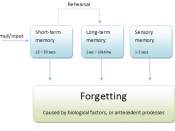Abstract
Fifty-one psychology students were recruited to determine the effects of olfaction and task complexity on recall. All participants were English literates. After giving participants a general idea of the study, participants were given a list consisting of either simple or complex words and tested on the number of words they could successfully recall. The odor variable was then introduced, followed by a similar memory test. While task complexity had an adverse effect on recall, odor failed to function as a distractor. Researchers' hypothesis that memory performance participants who are exposed to olfactory distractors will be adversely affected, and that memory performance will be negatively correlated with intensity of odor and complexity of task was only partly supported.
Introduction
Information is retained through the process of encoding, storing and retrieving. Encoding concerns initial perceptions and registration of information and storage refers to the retention of encoded information, whereas retrieving involves the extraction of the stored information (Roediger, 2004).
There are three categories of memory; sensory, short-term, and long-term (Plotnik, 2000). Sensory memory refers to the retention of information after the stimulus has been removed, and is considered to operate within the approximate time frame of under two seconds at the most (ScienceDaily LLC, 2004). Short-term memory is generally held to be information that has been transferred from the sensory memory banks as a result of selective attention, has a limited capacity, and operates within the time frame of up to 30 seconds (Goodhead, 2001). Long-term memory, on the other hand, is generally referred to as information that has been encoded semantically and lasts from minutes to a lifetime (ibid). The main difference between short-term memory and long-term memory is the superficiality or depth of processing that information has been subjected to (ibid). Memory is one of the most widely...


